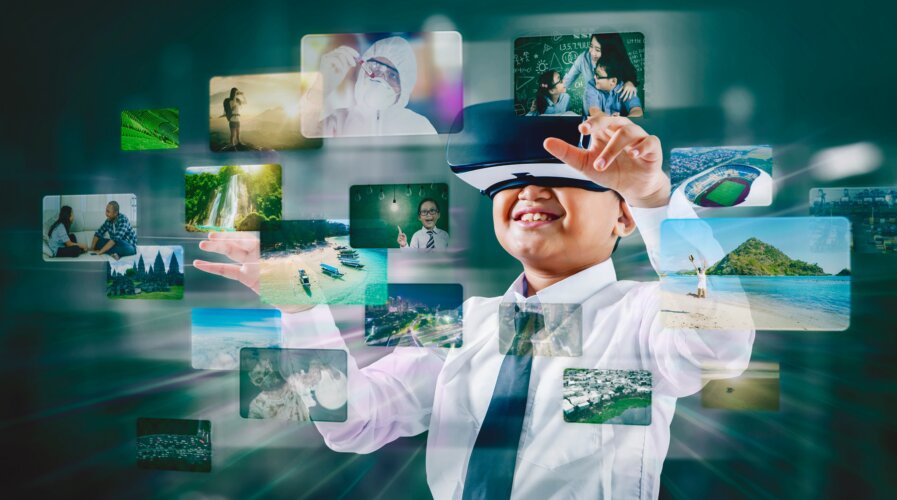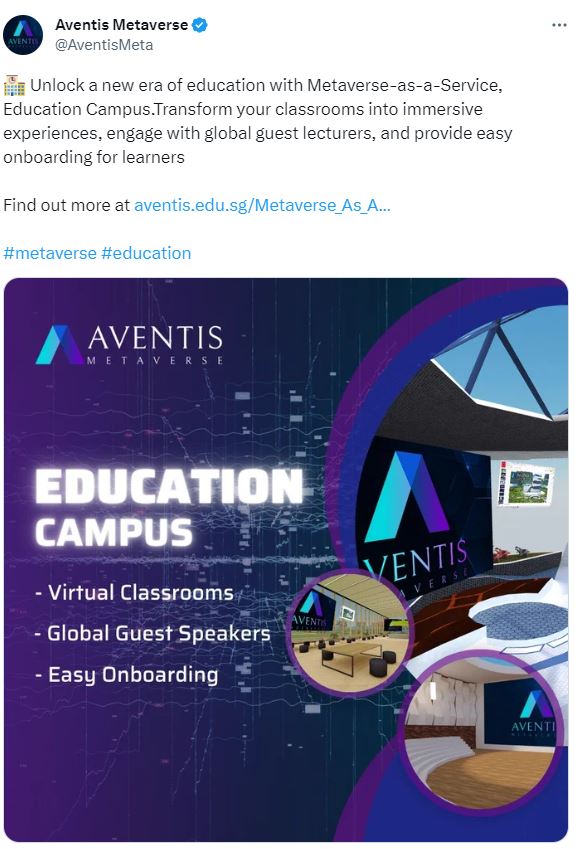
South Korea and Japan plan to use the metaverse for education. (Image – Shutterstock)
Metaverse: entertainment hub or education tool?
|
Getting your Trinity Audio player ready... |
When Mark Zuckerberg first unveiled the metaverse way back in 2021, it was not supposed to be a platform just for entertainment. In fact, Meta’s metaverse was supposed to be an online world where users could work, communicate and also play games in a virtual environment through VR headsets.
Zuckerberg believed the metaverse was the answer to work-from-home fatigue during the pandemic. He felt that the metaverse would serve as a platform for users to escape reality, yet remain productive. When it was launched, one of the earliest demos was of his avatar speaking to co-workers in the metaverse.
Soon, everyone wanted to be a part of the metaverse. Other tech companies started pouring in millions to develop their own metaverse platforms. Some companies even took to enhancing their digital worlds to cater directly to entertainment purposes. Fashion brands like Nike and Adidas started selling digital apparel in the metaverse, which users would buy – with real currency – for their avatars.
Real estate in the metaverse reached new heights as well. Brands were competing to have the best design and spot in the metaverse to attract more users. Decentraland, a 3D virtual world browser-based platform like the metaverse held the first ever virtual concert. However, all the hype was slowly fading.
To fully experience the metaverse, a user would need to invest in VR headsets. While there are many varieties available, the prices were not really affordable to the masses. Platforms like Decentraland and The Sandbox, another immersive experience platform, soon reported huge drops in users. According to reports, data from DappRadar in October 2022 suggests metaverse platforms Decentraland and The Sandbox each have fewer than 1,000 “daily active” users, despite US$1 billion valuations.
Today, the metaverse is nowhere near achieving these goals. In fact, apart from being used as an entertainment platform, there isn’t really much one can do in the metaverse. McKinsey predicts that the metaverse has the potential to generate up to US$ 5 trillion in value by 2030 and is too big for companies to ignore.
Unfortunately, companies are now moving away from the metaverse and are in favor of generative AI tools. As the metaverse would end up being like an entertainment platform for employees, more companies are switching their focus to generative AI investments that not only come with promises of improved productivity but are also a lot less expansive than investing in the metaverse.

A tweet on one of the many metaverse education programs.
Metaverse: From entertainment to education
While the metaverse use cases continue to flow toward the entertainment platform, there are some plans to use it for education. Several Asian nations are already planning use cases for the metaverse to boost education services.
According to Nick Clegg, President of Global Affairs for Meta, metaverse technologies have the potential to transform school lessons, bring teachers and students together remotely in shared spaces, enhance vocational training and create new opportunities for lifelong learning.
“For most of us, learning is social — we learn from and with others, and from each other’s experiences. It’s about interaction and discussion as much as it is about absorbing facts. Academic studies have found that VR can positively improve comprehension, knowledge retention, student engagement, attention span and motivation. I think that’s something we all intuitively understand. It is so much easier to remember doing something than being told something,” said Clegg in a blog post.
South Korea, which was among the first to invest in the metaverse, initially had plans to develop government use cases for the platform. The country invested US$177.1 million in a move it hoped could provide a blueprint for others to follow.

The Seoul Metropolitan Government (SMG) is officially rolling out the first service phase of its virtual municipal world Metaverse Seoul, the first-ever platform of its kind in the entire world. (Source – Seoul Metropolitan Government)
South Korea is funding 40,000 professionals and 220 companies specializing in metaverse technology. They’re already off to a great start with the launch of Metaverse Seoul, the first virtual public administration platform in the world. However, according to a recent survey by the Korean Information Society Development Institute, only 4.2% of South Koreans have regularly used metaverse services.
But that isn’t slowing the country’s mission. The Pohang University of Science and Technology in South Korea is being transformed into a “metaversity”. The university plans to digitize classrooms in the metaverse and offer courses in cyberspace. The university has also invested US$300,000 in equipment and program development for students and allocated another US$500,000 to create metaverse classrooms.
Meanwhile in Japan’s N and S high schools, the largest online high schools in the country, more than 6,000 students learn in virtual reality (VR) using Meta Quest 2 headsets. Their teachers report that this enhances the learning experience and enables students to nurture social skills even when they are physically far away. A survey on VR participation showed a satisfaction rate of more than 98%.
While it remains to be seen how this can be applied to other use cases in the future, for now, the metaverse has found itself a key education platform and not just another entertainment site.
As Clegg puts it, “Metaverse technologies have the potential to transform education. It’s happening right now, but realizing the potential in the years ahead will require educators and policymakers to grasp the opportunities these technologies present.”
READ MORE
- Safer Automation: How Sophic and Firmus Succeeded in Malaysia with MDEC’s Support
- Privilege granted, not gained: Intelligent authorization for enhanced infrastructure productivity
- Low-Code produces the Proof-of-Possibilities
- New Wearables Enable Staff to Work Faster and Safer
- Experts weigh in on Oracle’s departure from adland


